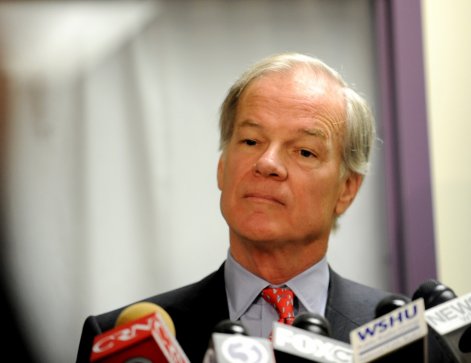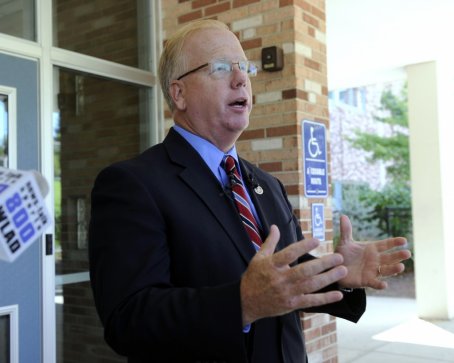The congressional impasse over Obamacare that brought the federal government to a screeching halt Tuesday has created a schism among some of the Republican contenders for governor.
Tom Foley, who is eyeing a rematch with Democrat Dannel P. Malloy in 2014, stood with the House GOP caucus and Speaker John Boehner, R-Ohio, on their attempt to force Congress to delay the start of the provisions of the Affordable Care Act.
“I blame the president and I blame Harry Reid,” Foley, the 2010 GOP nominee for governor, said of the controversial shutdown.
A private equity manager from Greenwich who served as U.S. ambassador to Ireland under President George W. Bush, Foley said Democrats are trying to ram through all of the elements of the flawed health care law, including those aspects that are driving the system to a single-payer model.
While he does not favor repeal of Obamacare the way many Tea Party members do, Foley defended the negotiating tactics of House Republicans.
“So I support what they’re doing,” Foley said. “I think some modified version of the health care bill that provided for universal health care, provided for coverage for pre-existing conditions, for example, and some other things in this bill are things that the majority of Americans support. (But) there are an awful lot of things in Obamacare that Americans don’t want and we can’t afford.”
Danbury Mark Boughton, who was Foley’s running mate in 2010 when the pair lost by 6,500 votes to the Democratic ticket of Malloy and Nancy Wyman, didn’t spare Republicans.
“It’s a bipartisan train wreck,” said Boughton, who is also exploring a run for governor. “Both Democrats and Republicans have backed themselves into a corner. What we have is a divided, split government. The president refuses to take a modest request on Obamacare. The Republicans won’t manage their demands a little better, so we end up with intractable stalemate.”
Boughton said it’s too early to tell what the effects of the shutdown will have on his city. Federal grants, including Community Development Block Grants and Head Start funding, can be managed for a month or two, he said. He said that if air traffic controllers are taken away in a long-term shutdown, there’s an automated system at the airport.
“This won’t really affect us for a week or two,” he said, adding that he’s “optimistic” that the showdown will end.
On Monday, state Democratic Chairwoman Nancy DiNardo called on would-be challengers of Malloy to take a side in the stalemate.
“So I ask the candidates, do you stand with John Boehner and your fellow Republicans in the U.S. House on shutting down the government or do you oppose their irresponsible actions?” DiNardo said. ” If you oppose the forced shutdown of the government, will you send a letter to John Boehner’s office asking him to be reasonable and work with Democrats to negotiate a fair compromise that doesn’t shutdown the government and doesn’t eliminate Connecticut jobs?”
State Senate Minority Leader John McKinney, of Fairfield, the lone Republican to formally declare his candidacy for the state’s highest office, said he watched TV Monday night shaking his head with “disgust” at the partisan shenanigans in Congress.
“I’m disappointed and frustrated that both sides have engaged in a lot of partisan politics and not a lot of honest policy negotiations,” McKinney said, adding that he was “stunned” by U.S. Rep. John Larson’s attack on Republicans.
“These are the people who are running our country and they can’t sit down together?” McKinney said. “It amazes me at how there is a refusal at a time when both sides need to compromise. The Republicans have one chamber and the Democrats have one chamber and there is no movement.”
McKinney said he’s heard “a lot of concerns” about the Affordable Care Act.
“Lots of employers have said to me that they are considering dropping coverage and have those employees in the exchange,” McKinney said. “I am not sure why they don’t consider delay of the implementation until everyone can figure out how it can work. That seems like a fair point of compromise. What really resonates for me is that our members of Congress need to start living under all the laws they pass for everyone else and it doesn’t appear they’re willing to do that.”
State Sen. Toni Boucher, R-Wilton, who last month filed exploratory paperwork for a potential run for governor, downplayed the gravity of the shutdown.
“We’ve had federal shutdowns many times in the past,” Boucher said. “They were very short-lived. The impacts were not as great as the alarm is. I think a lot of it could be theater to put pressure on other folks.”
From her experience in the Legislature and having served as ranking member of Labor and Public Employees Committee, Boucher said Connecticut should have waited like many other states to open the health care exchanges under the new law.
“Let them work out all the kinks,” Boucher said. “I still think it was a bad idea for us to stick our neck out.”
Boucher said that businesses and nonprofit organizations that offer their employees so-called Cadillac health care plans could be fined up to $3,000 per individual if the plan’s benefits are too rich.
“That is forcing them to no longer provide it at all, forcing them directly onto the exchange and putting us in an upheaval,” Boucher said.
—with reporting from Ken Dixon



